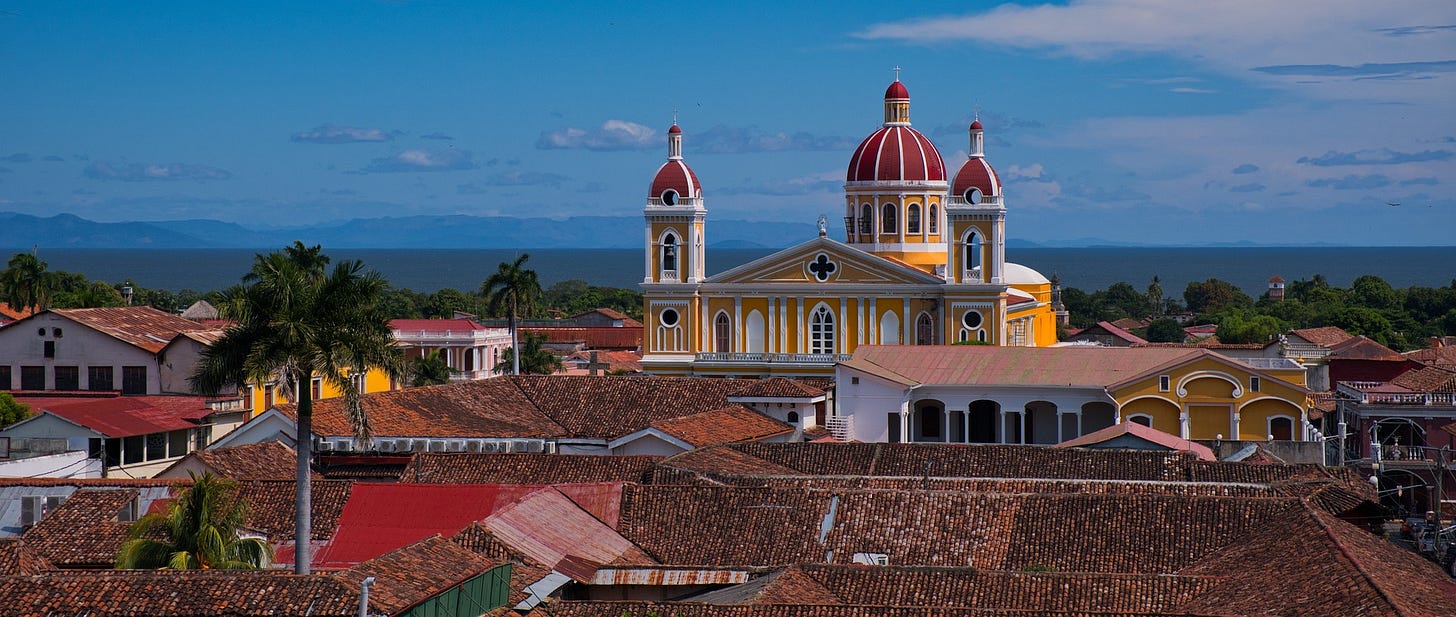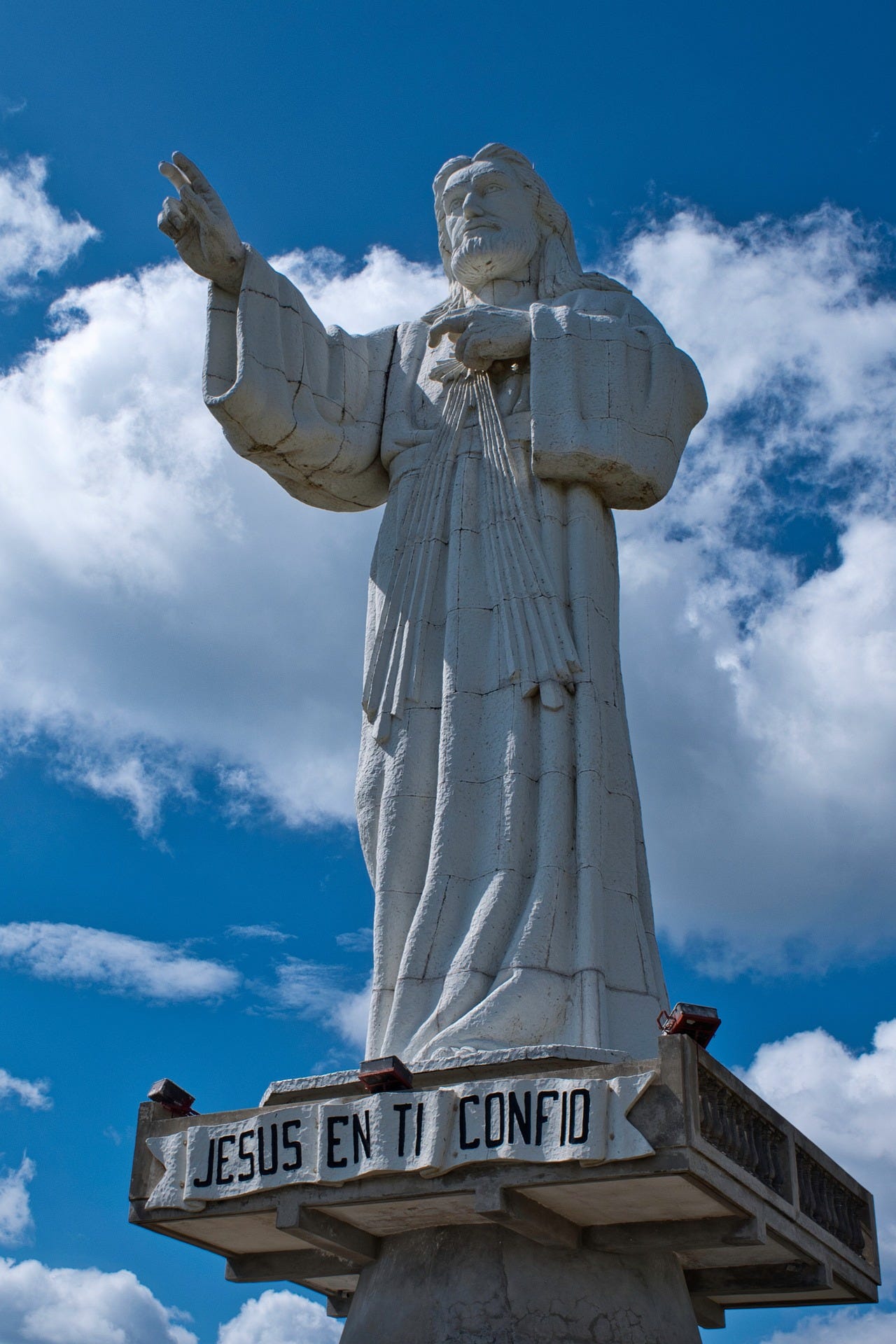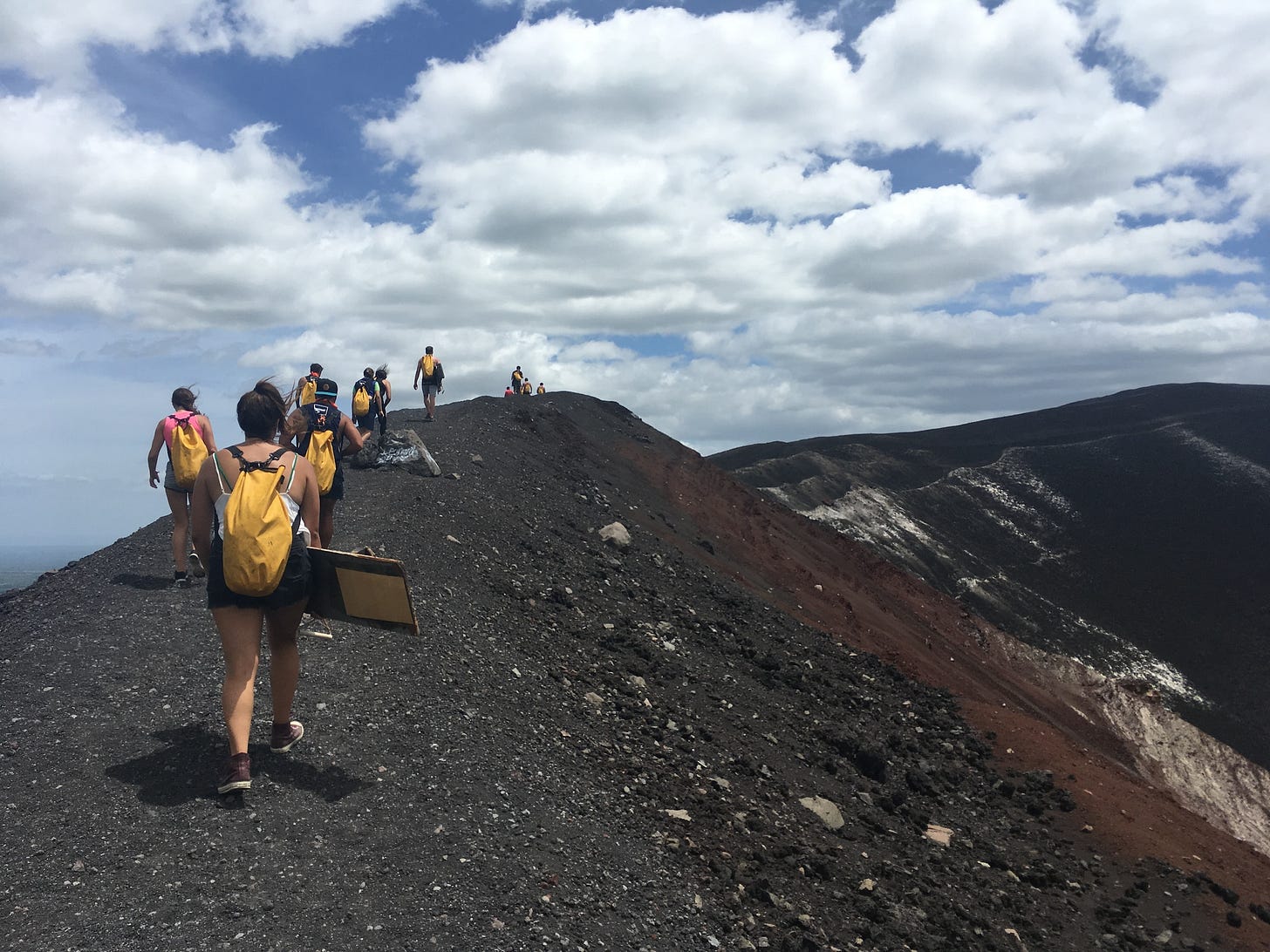Peter Declares That Jesus Is the Christ
Matthew 16:13-20
Introduction
Thank you for reading the Lectionary in Solentiname. If this is your first time here, welcome! Here’s some background on what this newsletter is. Ernesto Cardenal was a Nicaraguan priest, poet, politician, and liberation theologian. One of his projects was to read the four gospels with the campesinos of Nicaragua, learning from them as much as he taught. If the Jesus ministered, taught, healed, and living among the poor people of first century Judea, then perhaps the least of these today can help us better understand Jesus’s message. We participate in this by reading The Gospel in Solentiname, Cardenal’s collection of their discussions. If you would like to learn more about the context of these conversations, there’s nothing better than reading Cardenal’s introduction to the book here.
Last week, we read about Jesus healing the daughter of the Canaanite woman. You can read that here. This week, following the Revised Common Lectionary, we are reading about Peter declaring Jesus the Christ.
Lectionary Reading
Matthew 16: 13-20
Now when Jesus came into the district of Caesarea Philippi, he asked his disciples, “Who do people say that the Son of Man is?” And they said, “Some say John the Baptist but others Elijah and still others Jeremiah or one of the prophets.” He said to them, “But who do you say that I am?” Simon Peter answered, “You are the Messiah, the Son of the living God.” And Jesus answered him, “Blessed are you, Simon son of Jonah! For flesh and blood has not revealed this to you but my Father in heaven. And I tell you, you are Peter, and on this rock I will build my church, and the gates of Hades will not prevail against it. I will give you the keys of the kingdom of heaven, and whatever you bind on earth will be bound in heaven, and whatever you loose on earth will be loosed in heaven.” Then he sternly ordered the disciples not to tell anyone that he was the Messiah
Solentiname Reading
Jesus asked his disciples who people were saying that he was, and they said:
Some say John the Baptist; others say Elijah, and others say Jeremiah or some other prophet.
TERE: “He saw that the people were following him, and it seems that he wants to know why.”
WILLIAM: “He's interested in knowing what the people were thinking. And the people are never wrong. John the Baptist and all the prophets had denounced evil governments, right? And that's the reason the people said that Jesus was a new John or a new prophet. And the people weren't misled when they saw him as an accuser. But there was something the people couldn't yet know.”
Then he said to them: “And you, who do you say that I am?”
WILLIAM: “And he wants to see if the ones who have been closest, the ones who know him most intimately, have now realized…”
OSCAR: “I feel that he's now asking us the same question, in this community: Who am I in your eyes? I'm going to answer for myself, as Peter answered for himself. For me, he is one who is making me change, since I came to know him (not long ago). I was a real selfish bastard, and now, it seems to me, I'm getting to be less of a one. And he has united me with others. And he's the one that keeps us united in this community. He has brought us together. What for? To unite, with groups like this, the whole world, and to change the world.”
Simon Peter then said to him: “You are the Christ, the Son of the Living God.”
I said that “Christ” is the Greek word christos, which means “anointed” and is a translation of the Hebrew word Mashiah (Messiah), which also means “anointed.” This is the first time in the Gospels that Jesus is proclaimed the Messiah. Peter is saying here that Jesus has been anointed king, and that he comes to free the people and to establish the kingdom of God.
OLIVIA: “That's very different from what the rest of the people were saying, that he was a new prophet. Because prophets used to announce the kingdom, while with Jesus the kingdom came.”
ELVIS: “The kingdom began. But it's still a long way from being established throughout the earth.”
OSCAR: “But that day is closer and closer, I say.”
Jesus answered him: “Blessed are you, Simon, son of Jonah, because no man has shown you this, but my Father who is in heaven.”
TOMAS: “Because there are things that are learned through people. For example, one person can teach another person to read. But the wisdom of God only God teaches.”
REBECA: “The truth is that the people couldn't know that he was the Messiah if they still weren't seeing any change. They had to think that he was just a prophet, an accuser, like there had been before. And they couldn't know either that he was the Son of God, because in the people's eyes he was just the son of Saint Joseph.”
One of the Guevara girls: “It seems to me that the true wisdom is that of love, and that's why it says that that wisdom is not transmitted by men but comes from God, because God is love.”
WILLIAM: “What they were seeing was that Jesus was a man poorly dressed, humble, a proletarian, and in his presence they didn't see anything that seemed to be a kingdom. But Peter understood in a mysterious way that this man was no longer a prophet but the one who was coming to fulfill the prophecies of the prophets. And Peter believed in the changing of the world. That's why Jesus calls him blessed. And we too must feel ourselves blessed, this little group here, because we too believe in the changing of the world.”
“But there are many Christians,” I said, “who still believe that Jesus is nothing more than a prophet, that he has come to announce a future salvation but not to bring about any revolution in the present. They believe in Jesus in many ways but they don't believe in him as the Messiah. These people, the ones who don't believe in the changing of the world, Saint John calls them the Anti-Christs, the Anti-Messiahs.”
And I say to you that you are a rock, Peter, and on this rock I am going to build my church, and not even the power of death will be able to conquer it.
I said that Petros in Greek is “rock,” and this is a nickname that Jesus is giving to Simon when he announces that upon him he will build his church. I said also that the Spanish word iglesia [church] comes from a Greek word, ekklesia, which didn't mean at that time a religious institution but simply a gathering, or even better, what we call today a community. I also said that we were used to the translation: “The gates of hell will not prevail against it,” but that “the power of death” is more exact because Jesus was not talking about hell as we understand it now, but about the sheol of the Jews or the hades of the Greeks (the region of the dead). Jesus refers to death as a kingdom or an enemy community. Among the Jews, who put walls around their cities, the word “gates” meant military power.
MARCELINO: “He gives Simon the nickname ‘Rock’ because he's going to build something new. It has to be on firm rock. The firm rock, it seems to me, is the faith that he is the Messiah, the Liberator, the one who's going to change the world. Our community of Solentiname must also be based on that faith. If it isn't, the same thing will happen to us that happens to religion in many parts of the country. It's like an old house that's falling down, all shattered by the earthquake.”
His wife, REBECA: “A church without faith can't be a church. It's not a community. And without that faith, we really live without life; we live without any hope.”
MANUEL: “He called Peter the leader, perhaps because he was the most vigorous. He wasn't a drivelling idiot. He was the toughest. Peter was tough. Remember when he tore the guard's ear off. Christ must have said: ‘This is no ordinary son-of-a-bitch. I want him to be the head of my community.’”
I said: “We have read that Jesus called Simon ‘Son of Jonah’ (which in Hebrew is Barjona), but some people now think that this could have been an error in translation, because that word also means ‘terrorist.’ They think that that was another nickname that he used to have—Simon the Terrorist—and that probably meant that Simon belonged to the national liberation movement of the zealots, supporters of armed struggle. That explains why, when Jesus announced his death, he was violently opposed to the idea of Jesus allowing himself to be killed. And when they came to arrest Jesus, why he would have drawn his sword.”
Another of the Guevara girls: “That also explains why he had more faith in the Messiah, in the Liberator, because he was in the guerrilla movement.”
OSCAR: “Standing face-to-face with this other man, he didn't hesitate to tell him that he was a Son of God, right? And Jesus noticed that nobody else dared to talk with the firmness Peter talked with. Then Jesus told him he was a rock, and that he could form a community. And it's this community of ours that must also be hard as a rock because it has many enemies.”
OLIVIA, who had just lost her daughter Olguita: “And the greatest enemy is death, but Jesus says that not even death is going to prevail. It's not that none of us is going to die. Everybody dies, individually, physical death. But in community we don't die because we are in community with him, and he has conquered death. He has risen from the dead. That's why not even death can do anything against this community.”
WILLIAM: “And if death can't do anything, the other enemies can do even less. They're the allies of death.”
I shall give you the keys of the kingdom of heaven; whatever you bind here in this world will be bound also in heaven, and whatever you loosen in this world will be loosened in heaven.
I said that just as Jesus had spoken earlier of the “gates” of death, he also speaks of the kingdom of God as a walled city, and he gives Peter the keys to those doors. The kingdom of God is different from the church or community that he had spoken about before. The community is to prepare for that kingdom. Whatever he does or undoes among people will be corroborated “in heaven,” that is, before God. We know that Matthew often, in order not to mention the name of God, uses the word “heaven.”
MANUEL: “It means that Saint Peter doesn't have the keys to the entrance to heaven. The keys of the future society of people, those are the keys of heaven.”
REBECA: “The keys are love. Because the one who loves enters and the one who doesn't love doesn't enter. They aren't keys so that he can let you enter or not let you, as he chooses.”
OLIVIA: “It seems that he's saying that he's giving him the keys because he's giving him a very big responsibility, a pledge to the people.”
FELIPE: “He goes away, he departs, leaving the kingdom as a responsibility of people.”
MANUEL: “He's giving Peter authority. And the same way he's giving that authority to the bishops and to the priests and to all the leaders of the church. With that authority in many parts of the world they are condemning the rule of the capitalists, since many people are dying because of those same capitalists. They are defending the exploited people. And so we must support that authority, we all must, when they are in favor of the people and attack the governments, because they are speaking in the name of God.”
Another young man: “And when the leaders of the revolution here in Nicaragua speak, we must support them, too, because the leaders are also speaking the truth. They also are speaking in the name of God.”
MANUEL: “Well, it used to be that the bishops and the priests weren't on the side of the people. It's been almost five years, or maybe ten (I'm not sure it's that long) that they've spoken up for the people. And if they were with the oppression they weren't with the community of Christ, their church. But every leader of social change, of the coming of the kingdom of God, is also a representative of the community of Christ.”
I said that the church that Christ founded upon the rock of Peter (maybe because Peter, a militant in a national liberation movement, had a firm messianic faith) was intended to create the kingdom, but the kingdom would not be the church. It would overflow it and it would cover the whole earth. And Saint Paul said that in the end Christ will deliver this kingdom to the Father after destroying all “dominion” and all “authority” (when people are entirely free), and that the last enemy to be destroyed will be death. For that reason, as Christ says, the gates of death will not prevail.
Then Jesus ordered his disciples to tell no one that he was the Christ.
OSCAR: “Maybe because he didn't want everybody following him like sheep. He wanted them to believe with a firm faith like Peter and not because they were dragged along by somebody else.”
JULIO GUEVARA: “Or maybe he didn't want a lot of publicity.”
REBECA: “He wanted them to know him as Peter knew him, because God enlightened them, and not because other people said to them ‘That one is the Christ,’ ‘That one is the Christ.’”
FELIPE: “And if he had declared himself the liberator of the poor from the beginning, they would have screwed him right then and there.”
I said that to be declared Messiah or “the Anointed One” (King of Israel) was doubly dangerous. First, with the people because it lent itself to false interpretations, since in those times the Jewish nationalists were waiting for the Messiah only as a king that would free them from Roman rule. And the kingdom of Jesus was for the whole earth and its freedom would be from all authority and rule and even from death. That's why he always shied away when they tried to proclaim him king. And second, with the authorities because it led to his death. In fact that's why they condemned him to death, and Pilate ordered them to write the crime (a political crime) on the cross: that he had declared himself king.
Someone said: “There are still many places today where it's dangerous to say this.”
Next Week
Join us again next week for a discussion of Jesus foretelling his death.
What was the most interesting part of this week’s discussion? I enjoyed Oscars’ identification of Jesus as the one who unites us with each other, making us change in the selfish ways that prevent that. Let me know your opinions in the comments. Thanks for subscribing and sharing. I’ll see you next week.



